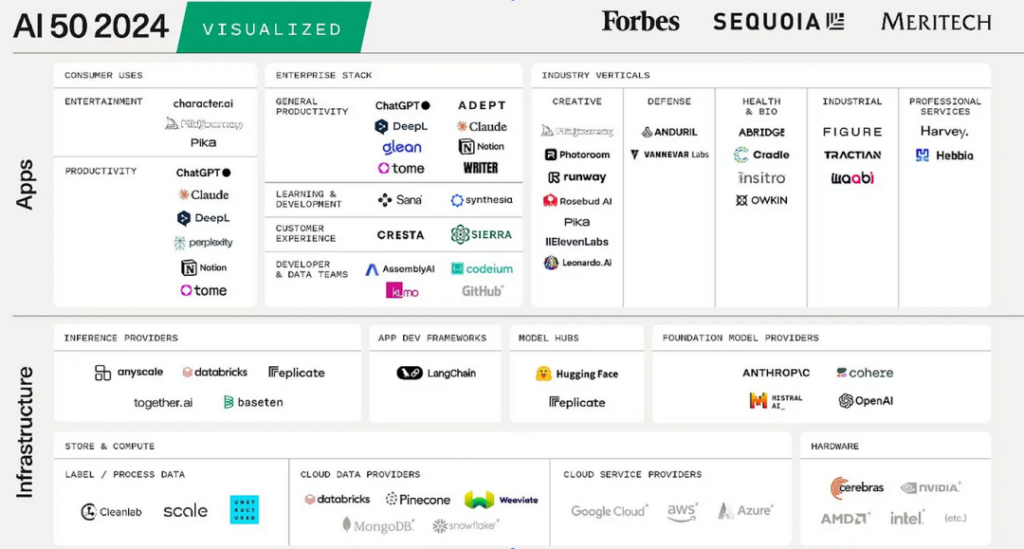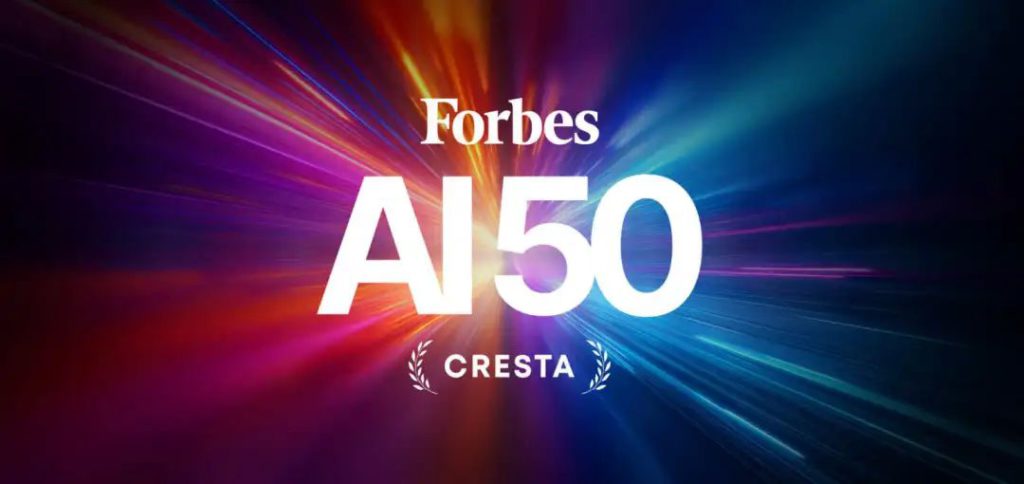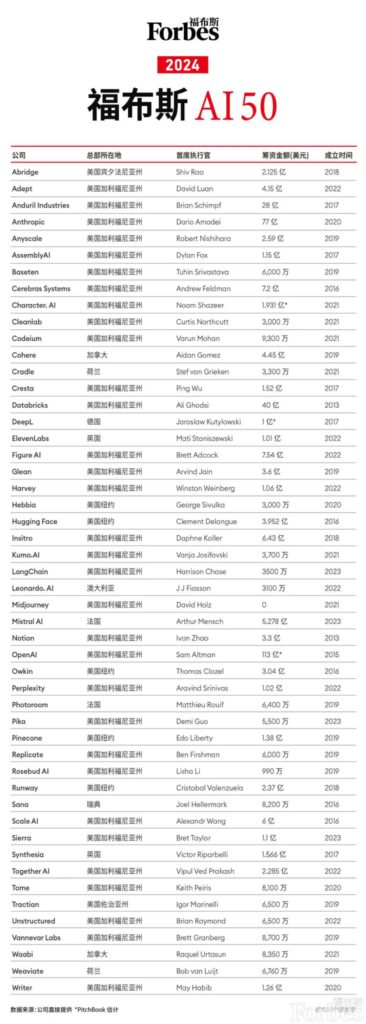During the spring of 2023, the popularity of applications like ChatGPT stimulated companies to scramble to adopt the latest generation of artificial intelligence technology. One year later, the excitement continues. In line with this, a new tech economy has emerged to help companies develop and deploy artificial intelligence-driven technologies.
List of TOP50 global artificial intelligence announced
Forbes, in collaboration with Sequoia and Meritech Capital, launched the sixth annual Artificial Intelligence TOP50 (AI 50), an award designed to recognize the most promising private artificial intelligence companies.
The artificial intelligence products on this list have vast applications and far-reaching effects.
OpenAI has a market value of $86 billion, and its customers include Morgan Stanley and the government of Iceland; OpenAI rival Anthropic has a market value of $18.4 billion, and its customers include Bridgewater and Boston Consulting Group.
Databricks, a company with a market value of $43 billion, sells its data analytics and artificial intelligence implementation software to Shell Oil Company and the United States Postal Service.
For startups in the top 50 artificial intelligence companies, artificial intelligence technology has evolved from "customer fantasy" to "generating billions of dollars in revenue."
Startups also attract the attention of Silicon Valley investors. At the same time, once-hot industries are facing continued declines in financial markets.
This year's top artificial intelligence companies raised a total of $34.7 billion, nearly a third from OpenAI, thanks to about $10 billion in funding from Microsoft.
Much of the funding comes from emerging artificial intelligence research companies, such as Anthropic (raised $7.7 billion), Cohere (raised $445 million), and Mistral AI (raised $528 million). The basic products of these startups are to help a variety of businesses work.
In addition, many companies joined the list of top 50 artificial intelligence companies for the first time after completing their growth indexes in 2023, such as Baseten, LangChain and Unstructured.
Other forms of artificial intelligence have also received attention and development.
For example, Anduril has raised $2.8 billion for defense technology; Insitro has earmarked $643 million in cash for drug research and development; and Figure AI raised $754 million to build human-like robots.
Others are integrating the latest advances in artificial intelligence coherently into their own applications.
Abridge uses speech recognition and language summarization technology to provide automated documentation for medical treatment; Notion is getting closer to its goal of replacing Google Workspace or Microsoft Office; and Perplexity hopes to reinvent search.
Competition in the field of artificial intelligence is increasingly fierce. Forbes received about 1,900 applications this year, twice as many as last year.
Furthermore, candidates do not need to pay any fees to participate, and their business prospects and applications of artificial intelligence technology will be evaluated through quantitative algorithms and quality judges. quantity.
Forbes officially states: "We encourage companies to share diversity data, and our lists are designed to foster a more equitable startup ecosystem, but gaps in the industry remain clear."
“Only 12 firms have female associates, and five of those are CEOs, which is the same number as last year.”
Explanation of the list
Forbes' latest artificial intelligence TOP 50 list shows that new startups in the field of artificial intelligence are changing to become more youthful and flexible. While established companies like Anduril Industries, Databricks and OpenAI maintained their positions, 28 new entrants stole the limelight.
Startups excel at selling artificial intelligence infrastructure and applying artificial intelligence to real-world problems.
Notable companies include Pinecone, LangChain, AssemblyAI, Abridge, Sierra, and Notion. Investors are bullish on artificial intelligence startups, and a large amount of funding has valued many companies at $1 billion or more.
Despite facing challenges from the market, artificial intelligence startups continue to attract investment, a sign of their patience.
Efficiency characterizes these startups, with impressive milestones achieved with smaller teams than existing companies. Paris-based startup Mistral AI exemplifies this trend, with its valuation reaching $2 billion within a year.
Europe is becoming a vibrant hub for artificial intelligence, with new startups like Mistral, Photoroom, Cradle and ElevenLabs making waves.
Promising artificial intelligence startups are growing strongly in major centers such as London, Paris and Zurich, challenging traditional technology hubs.
The future of artificial intelligence
In the field of artificial intelligence, the landscape is evolving rapidly, with startups becoming increasingly leaner and more agile.
OpenAI founder Altman once imagined a billion-dollar company with just one employee. Now, that idea is gradually becoming a reality.
Of the top 50 artificial intelligence companies this year, only a few have 1,000 or more employees, such as Anduril Industries, Databricks and OpenAI. New companies are the center of attention. There are 28 companies listed for the first time. They are characterized by small team sizes and large growth potential.
A significant number of these new companies have made significant progress in selling AI infrastructure or applying AI to real-world use cases. Pinecone, LangChain and AssemblyAI are prime examples, with their values skyrocketing into the hundreds of millions of dollars.
Others, like Abridge and Sierra, are creating niches in healthcare and customer service based on AI, while giants like Notion are integrating AI Advanced creation into production tools.
Konstantine Buhler, a partner at Sequoia Capital, predicts that in the future, artificial intelligence will penetrate all aspects of business operations, similar to the digital transformation of the past.
The AI 50 list reflects a trend where startups are younger and have ever smaller teams, while receiving large amounts of investment.
This trend is in stark contrast to sectors such as crypto assets and financial technology, which are facing market crashes.
A significant number of leading artificial intelligence companies have valuations of $1 billion or more, demonstrating investor confidence in the potential of artificial intelligence.
Even amid market uncertainty, artificial intelligence startups are still attracting significant investment, a sign of their patience and growth potential.
Famous investors like Jeff Bezos and tech giants like Amazon, Google and Microsoft are betting on artificial intelligence startups, accelerating the industry's expansion.
What sets artificial intelligence startups apart, however, is their ability to achieve impressive milestones with relatively small teams. Despite growth in reported headcount, both the Medium and median headcount of the AI 50 decreased, highlighting the positive efficiency and agility of these companies.
Even the largest artificial intelligence startups, like OpenAI, have only a fraction of the number of employees of the industry's major players, signaling a formal shift in the competitive landscape. Paris-based startup Mistral AI exemplifies this trend, achieving a $2 billion valuation within a year of its founding.
Europe is becoming a stable of innovation in the field of artificial intelligence, with more and more new startups making waves on a global scale.
Europe's rich talent pool and supporting ecosystem is nurturing the growth of companies such as Mistral, Photoroom, Cradle, ElevenLabs and many more, many of which have their roots in famous organizations like Google's DeepMind.
As Europe's AI ecosystem flourishes, a large number of promising new startups are emerging in AI hubs in major cities such as London, Paris and Zurich, posing a challenge. a challenge to the dominance of traditional technology hubs.
As the latest AI 50 list shows, the rise of young and productive startups marks a market transformation. As investors increasingly value innovation and efficiency, established companies may face greater competition from newcomers.
Additionally, the emergence of a vibrant AI ecosystem in Europe highlights the global nature of AI innovation, presenting both opportunities and challenges to traditional technology hubs.
The full list is as follows:











